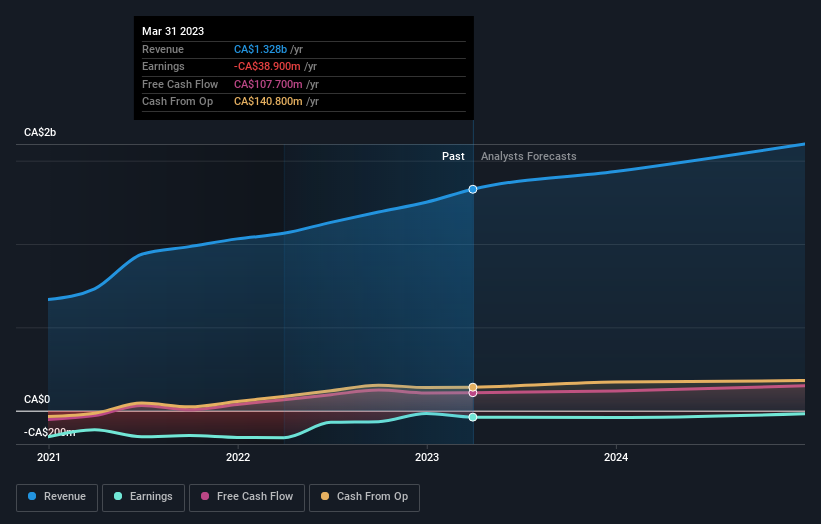- Canada
- /
- Healthcare Services
- /
- TSX:DNTL
dentalcorp Holdings Ltd.'s (TSE:DNTL) largest shareholders are individual investors who were rewarded as market cap surged CA$73m last week

Key Insights
- The considerable ownership by individual investors in dentalcorp Holdings indicates that they collectively have a greater say in management and business strategy
- A total of 4 investors have a majority stake in the company with 51% ownership
- Institutions own 12% of dentalcorp Holdings
A look at the shareholders of dentalcorp Holdings Ltd. (TSE:DNTL) can tell us which group is most powerful. The group holding the most number of shares in the company, around 42% to be precise, is individual investors. In other words, the group stands to gain the most (or lose the most) from their investment into the company.
As a result, individual investors collectively scored the highest last week as the company hit CA$1.3b market cap following a 5.7% gain in the stock.
Let's take a closer look to see what the different types of shareholders can tell us about dentalcorp Holdings.
View our latest analysis for dentalcorp Holdings

What Does The Institutional Ownership Tell Us About dentalcorp Holdings?
Institutions typically measure themselves against a benchmark when reporting to their own investors, so they often become more enthusiastic about a stock once it's included in a major index. We would expect most companies to have some institutions on the register, especially if they are growing.
We can see that dentalcorp Holdings does have institutional investors; and they hold a good portion of the company's stock. This can indicate that the company has a certain degree of credibility in the investment community. However, it is best to be wary of relying on the supposed validation that comes with institutional investors. They too, get it wrong sometimes. When multiple institutions own a stock, there's always a risk that they are in a 'crowded trade'. When such a trade goes wrong, multiple parties may compete to sell stock fast. This risk is higher in a company without a history of growth. You can see dentalcorp Holdings' historic earnings and revenue below, but keep in mind there's always more to the story.

dentalcorp Holdings is not owned by hedge funds. L Catterton Partners is currently the largest shareholder, with 39% of shares outstanding. Meanwhile, the second and third largest shareholders, hold 5.2% and 3.3%, of the shares outstanding, respectively. Graham Rosenberg, who is the second-largest shareholder, also happens to hold the title of Chief Executive Officer.
Our research also brought to light the fact that roughly 51% of the company is controlled by the top 4 shareholders suggesting that these owners wield significant influence on the business.
Researching institutional ownership is a good way to gauge and filter a stock's expected performance. The same can be achieved by studying analyst sentiments. There are a reasonable number of analysts covering the stock, so it might be useful to find out their aggregate view on the future.
Insider Ownership Of dentalcorp Holdings
The definition of company insiders can be subjective and does vary between jurisdictions. Our data reflects individual insiders, capturing board members at the very least. Management ultimately answers to the board. However, it is not uncommon for managers to be executive board members, especially if they are a founder or the CEO.
I generally consider insider ownership to be a good thing. However, on some occasions it makes it more difficult for other shareholders to hold the board accountable for decisions.
We can report that insiders do own shares in dentalcorp Holdings Ltd.. It is a pretty big company, so it is generally a positive to see some potentially meaningful alignment. In this case, they own around CA$89m worth of shares (at current prices). If you would like to explore the question of insider alignment, you can click here to see if insiders have been buying or selling.
General Public Ownership
The general public-- including retail investors -- own 42% stake in the company, and hence can't easily be ignored. This size of ownership, while considerable, may not be enough to change company policy if the decision is not in sync with other large shareholders.
Private Equity Ownership
Private equity firms hold a 39% stake in dentalcorp Holdings. This suggests they can be influential in key policy decisions. Sometimes we see private equity stick around for the long term, but generally speaking they have a shorter investment horizon and -- as the name suggests -- don't invest in public companies much. After some time they may look to sell and redeploy capital elsewhere.
Next Steps:
It's always worth thinking about the different groups who own shares in a company. But to understand dentalcorp Holdings better, we need to consider many other factors. Be aware that dentalcorp Holdings is showing 2 warning signs in our investment analysis , you should know about...
If you would prefer discover what analysts are predicting in terms of future growth, do not miss this free report on analyst forecasts.
NB: Figures in this article are calculated using data from the last twelve months, which refer to the 12-month period ending on the last date of the month the financial statement is dated. This may not be consistent with full year annual report figures.
New: AI Stock Screener & Alerts
Our new AI Stock Screener scans the market every day to uncover opportunities.
• Dividend Powerhouses (3%+ Yield)
• Undervalued Small Caps with Insider Buying
• High growth Tech and AI Companies
Or build your own from over 50 metrics.
Have feedback on this article? Concerned about the content? Get in touch with us directly. Alternatively, email editorial-team (at) simplywallst.com.
This article by Simply Wall St is general in nature. We provide commentary based on historical data and analyst forecasts only using an unbiased methodology and our articles are not intended to be financial advice. It does not constitute a recommendation to buy or sell any stock, and does not take account of your objectives, or your financial situation. We aim to bring you long-term focused analysis driven by fundamental data. Note that our analysis may not factor in the latest price-sensitive company announcements or qualitative material. Simply Wall St has no position in any stocks mentioned.
About TSX:DNTL
dentalcorp Holdings
Through its subsidiaries, provides health care services by acquiring and partnering with dental practices in Canada.
Undervalued with adequate balance sheet.
Market Insights
Community Narratives



